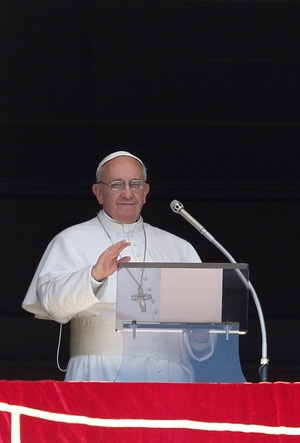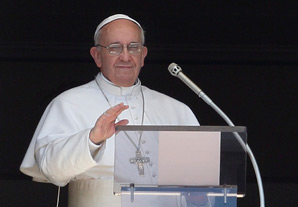
ROME (CNS) — The credibility of Christianity is undermined by pastors and faithful who preach one thing and do another, Pope Francis said.
“One cannot proclaim the Gospel of Jesus without the tangible witness of one’s life,” the pope said April 14 during a homily at Rome’s Basilica of St. Paul Outside the Walls.
Before beginning the evening Mass, Pope Francis walked down to St. Paul’s tomb under the main altar. He blessed the area with incense, and then bowed deeply in prayer for several minutes.
He was welcomed to the basilica by U.S. Cardinal James M. Harvey, the archpriest, who spoke of the importance of Rome’s two patron saints — Peter and Paul — and how their martyrdom in Rome should be a lesson to all believers that the “renewal of the church” requires that all Christians live their faith in their daily lives.
In his homily, Pope Francis said people outside the church “must be able to see in our actions what they hear from our lips.”
“Inconsistency on the part of the pastors and the faithful between what they say and what they do, between word and manner of life, is undermining the church’s credibility,” the pope said.
Pope Francis said St. Paul teaches Christians that following Christ requires a combination of three things: proclaiming the Gospel; bearing witness to the faith in one’s life, even to the point of martyrdom; and worshipping God with all one’s heart.
The proclamation of the faith made by the apostles, he said, was not merely or primarily in words. Their lives were changed by their encounter with Christ, and it was through their actions and their words that Christianity spread.
In the day’s Gospel reading, Jesus tells Peter to feed his sheep.
“These words are addressed first and foremost to those of us who are pastors: We cannot feed God’s flock unless we let ourselves be carried by God’s will even where we would rather not go, unless we are prepared to bear witness to Christ with the gift of ourselves, unreservedly, not in a calculating way, sometimes even at the cost of our lives,” Pope Francis said.
“The testimony of faith comes in very many forms,” the pope said. “In God’s great plan, every detail is important even yours, even my humble little witness, even the hidden witness of those who live their faith with simplicity in everyday family relationships, work relationships, friendships.”
While most Christians are called to the “middle class of holiness” of fidelity and witness in the normal business of everyday life, Pope Francis noted how in some parts of the world even average Christians suffer, are persecuted and even die for their faith in Christ.
Looking at what it means to worship God with all one’s heart, the pope said it, too, has a very practical, concrete expression. Worshipping God is not simply a matter of prayer — although that is a big part of it — but rather it means demonstrating in one’s life that God alone is God.
“This has a consequence in our lives: We have to empty ourselves of the many small or great idols that we have and in which we take refuge, on which we often seek to base our security,” he said.
“They are idols that we sometimes keep well hidden,” like ambition, careerism or a drive to dominate others, he said. “This evening I would like a question to resound in the heart of each one of you, and I would like you to answer it honestly: Have I considered which idol lies hidden in my life that prevents me from worshipping the Lord?”
At the end of the Mass, the Jesuit Pope Francis went into the basilica’s Chapel of the Crucifix where a 13th-century icon of the Madonna and Child hangs. St. Ignatius of Loyola and his first Jesuit companions made their vows as religious before the image in 1541.
Earlier in the day, the pope recited the “Regina Coeli” prayer with tens of thousands of people gathered in St. Peter’s Square. In brief remarks, he commented on the same Scripture readings used at Mass that evening.
Talking about the apostles’ courage in the face of persecution, Pope Francis told the crowd, “We cannot forget that the apostles were simple people; they weren’t Scribes or doctors of the law and they did not belong to the priestly class.”
Yet, he said, their faith was based on “such a strong and personal experience of Christ, who died and was risen, that they feared no one and nothing; in fact, they saw persecution as an honor that allowed them to follow in the footsteps of Jesus.”
— By Cindy Wooden Catholic News Service






